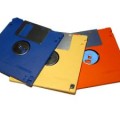Many of us at VOA are pack rats. Year after year, we would pile paper copies of our scripts along the wall. Then along came a tidier and safer innovation -- a circular piece of plastic just thirteen centimeters across with a hole in the middle, coated in oxide, and encased in a paper wrapper. It was called a "floppy disk," and it did flop like a fish when you shook it. We put the "floppy" -- we always just called it by its first name -- into a computer slot and moved or copied scripts onto it for safe storage. Out went the piles of paper. Neat, plastic boxes full of floppies replaced them on a single shelf. Then along came a smaller disk in a harder, unbendable jacket but still called a "floppy." It held even more scripts.
Then one day, our computer czar sent out a snotty note saying the agency's tekkies would no longer so much as touch floppy disks any longer. If we wanted what was on them, we'd best copy it onto newer devices with outer-space names like "flash drives." Before long, there wasn't a single machine left that would play the floppies that flopped. And when computer companies like Dell stopped building a floppy-disk slot into their new models, we knew the smaller floppy's days were numbered, too. Last month, the world's largest supplier of computer parts, based in Britain, announced it was plum out of floppies and would have no more to ship once the supply ran out. So the floppy disk has gone the way of the typewriter. OK, that's progress. But a fellow down the hall who kept on adding to his stack of paper scripts all these years is getting on our nerves with his gloating. "Didn't I tell you," he keeps saying, "those floppy thingys were a fad"?

